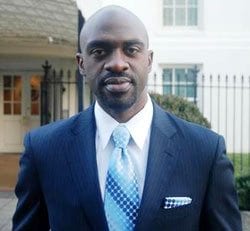
Michael Blake didn’t grow up expecting to work for the president of the United States.
However, he has been a regular of the West Wing since the 2008 election, when he was campaigning for President Barack Obama. Blake has come a long way from his humble start in the Bronx, his appreciation for which was emphasized during his visit to Cambridge earlier this week.
The energetic 28-year-old spoke to Harvard Business School students at Aldrich Hall Monday afternoon about his role at the White House, the strategy for his current project “Winning the Future” and plans for the economic state of the country.
Blake’s title, deputy associate director for Intergovernmental Affairs, is a mouthful. He sums up his job description in about the same number of words.
“Practically, I direct minority outreach for the White House, particularly in African American communities,” he said.
The extended introduction of Blake’s hour-long discussion offered background information, acquainting himself with the audience. It involved personal details and anecdotes, all delivered with energy, enthusiasm and a touch of humor.
He immediately gave his e-mail address and telephone number, joking about the District of Columbia area code.
“When I received my first phone call from ‘202,’ I thought that it was a bill collector and I let that call go straight to voicemail. But I learned that it was just the White House calling,” Blake said with a smile.
He gave a brief personal history about his family’s Jamaican roots, his mother’s period of homelessness and his own New York upbringing.
“It’s surreal to be here at Harvard, given what my family has been through to get where it is now,” Blake said. “My mother looks at what I’m doing now and jokes that ‘[we] went from no house to the White House.’ ”
Before his political career, Blake worked as a sports producer for Comcast SportsNet in Chicago. “I felt like I wasn’t helping people in the way that I wanted,” Blake says.
A political internship followed, which ultimately led him to his current position with the Obama administration.
At the start of his involvement with the “Winning the Future” project, Blake helped initiate a plan called “A New Foundation,” which involved building contacts and reclaiming job loss to boost productivity and competition.
“When I started the foundation, there were 760,000 lost jobs per month,” he said. “The last four months have experienced the greatest job growth since 1983. Clearly things are starting to grow here.”
Blake’s focus now is “Start Up America,” which helps aspiring entrepreneurs and small business owners. “This phase has five themes: educate; innovate; build; reform; and responsibility,” he said.
Blake emphasized the importance of education to create new pathways in this process. He encouraged everyone to “think through opportunities” that may not have occurred to the government yet.
“We have to go from problems to promise to prosperity,” he said, offering examples from his own life. “There needs to be a change of mindset, not just a conversation. There is so much untapped potential and we need to change the game.”
Blake reserved the final quarter of the presentation for audience questions, which he answered with his trademark intensity and focus. The issues covered business risks, the capital gains tax, foreign students and potential business owners, and responses to lay-offs.
Blake’s final thought about the discussion was a global one. “We’re looking at the future of America, but we need to think about how these processes can be applied worldwide,” he said. “It’s our goal to look at the deeper issues and try to tackle them practically.”






